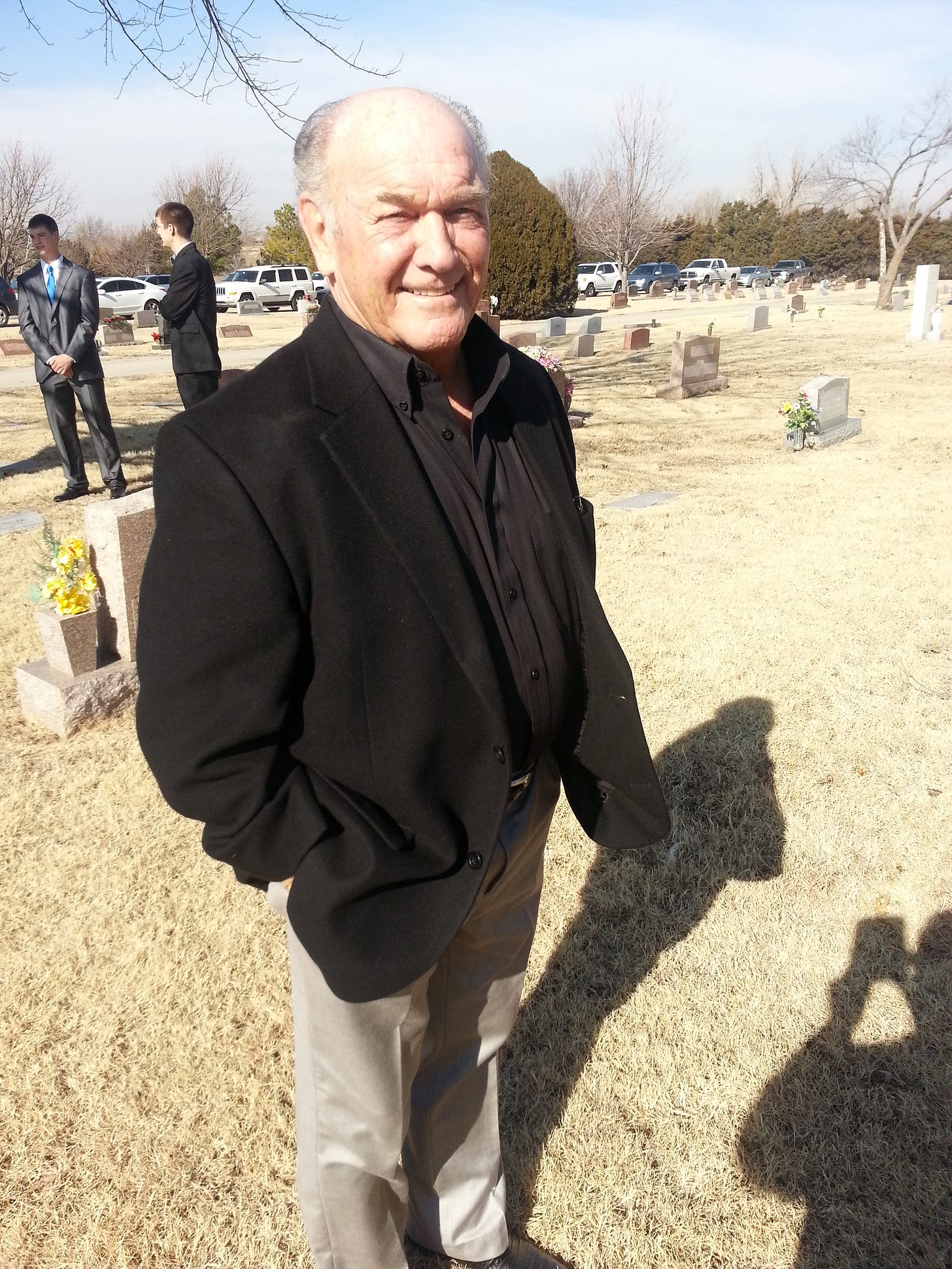Where Are the Dead?
The four Biblical views of a person's existence after death until the resurrection.
‘For me to live is Christ, and to die is gain.’ - Philippians 1:21
I enjoy taking risks by writing essays that cause people to stop and think.
However, sometimes readers can get upset by what I write.
I don’t intend to offend; I only aim to prompt everyone to think critically.
The ‘intermediate state’ is a theological concept that speculates regarding what kind of body, if any, believers in heaven have while they wait for their physical bodies to be resurrected.
The 4 Christian Views of the Intermediate State
My father died on May 5, 2024.
I am familiar with Greek (the language of the New Testament), Hebrew (the language of the Old Testament), and, of course, my native language, English.
I dare not tell you where my father is, right now, in terms of time as we know it.
Why am I hesitant?
Christians throughout history have interpreted the Bible in four different ways regarding death and the resurrection.
What happens to the human being between death and the resurrection is called ‘The Intermediate State.’
I know enough not to be dogmatic in any emphatic manner.
There are four views, each of which is based on sacred, conservative intreprations of the Bible.
John Calvin cautions about professed certainty on the Intermediate State:
It is neither lawful nor expedient to inquire too curiously concerning our souls’ intermediate state. Many torment themselves overmuch with disputing as to what place the souls occupy and whether or not they already enjoy heavenly glory. Yet it is foolish and rash to inquire concerning unknown matters more deeply than God permits us to know. Scripture goes no farther than to say that Christ is present with them, and receives them into paradise (cf. John 12:32) that they may obtain consolation, while the souls of the reprobate suffer such torments as they deserve. (Institutes 3.25.6)
With Calvin’s caution in mind, and with the recognition that great scholars like Lorraine Boettner wrote with a familiarity of all views, while espousing none:
I write to help familiarize you with the four differing Christian views of the Intermediate State, that is, the time between death and the general resurrection.
View #1 - Death Is Human Sleep In the Grave Until the Final Resurrection

The theological position of death as ‘unconsciousness (sleep)’ finds strong support in the teachings of Martin Luther and other Reformers who emphasized the soul’s rest in unconsciousness between death and the resurrection.
Luther described death not as the soul’s entrance into immediate bliss or torment, but as a state of peaceful slumber, where the believer awaits the final resurrection in Christ.
Luther wrote:
‘We should learn to view the death of the saints as a deep, peaceful sleep. They feel nothing at all… they lie and sleep until the day of judgment.’ - Luther’s Commentary on Ecclesiastes.
Luther’s view was rooted in Scripture’s frequent metaphor of death as sleep (e.g., John 11:11-14; 1 Thessalonians 4:13-15), reinforcing the belief that the dead are not conscious but await the awakening voice of Christ.
Other Reformers, like William Tyndale, echoed this “soul sleep” position, particularly in their opposition to the Roman Catholic doctrine of purgatory and the veneration of saints.
Tyndale argued in his debate with Thomas More that if the souls of the righteous were already in heaven, then the resurrection would be unnecessary.
Similarly, the early Anabaptists and some later groups, such as the Seventh-day Adventists, maintained the doctrine of conditional immortality—asserting that eternal life is granted only at the time of the resurrection.
Although not all Protestants endorsed this teaching (John Calvin notably rejected it, as you will see below), the concept of the ‘sleep of the soul’ remained an influential theological position throughout Christian history, emphasizing the hope of resurrection as the believer’s ultimate and final victory over death.
View #2 - God Gives Temporary Bodies to People at Death, then Eternal Bodies at the Resurrection.


Most Christians see a loved one’s death as a transition (bodily) to another realm.
Two popular evangelical teachers, John MacArthur, who died this week, and R.C. Sproul, who died in 2017, were friends and influential in the lives of many Christians.
Their mutual friendship and respective deaths have sparked social media photographs like the one above, where evangelical Christians imagine ‘the dead in Christ’ having an immediate reunion with each other in heaven.
For that physical reunion to happen, while John MacArthur’s and R.C. Sproul’s bodies are placed in their respective earthly graves, God must grant new, temporary bodies in ‘the Intermediate State.’
Several Christians hold to this view that the soul receives a provisional ‘spiritual’ or intermediate body after death, being later replaced by a permanent resurrection body.
From Grave to Glory by Murray J. Harris proposes a ‘temporary spiritual body.’
Heaven by Randy Alcorn argues that an ‘intermediate body’ is God’s temporary gift.
Death and the Afterlife by Origen discusses the stages of embodiment after death.
Randy Alcorn uses a vivid illustration to enhance his view of the Intermediate State:
‘It’s like going to a sauna and receiving a robe for the duration of the sauna visit, then putting on your clothes after the time of the treatment is over.’
View #3 - When a Person Dies, the Disembodied Soul Continues to Exist until the Resurrection.
This position, held by many Christians, is evident in statements like:
‘He’s obtained his angel wings now.’
‘She’s left her earthly body and now enjoys heaven.’
‘The soul, the real person, has left its body and still lives.’
This view of a ‘disembodied existence’ is based on passages such as Philippians 1:23 (‘to depart and be with Christ, which is far better’) and Revelation 6:9-11, where the souls of martyrs seem to be crying out to God under the altar, awaiting the final judgment.
After death, the soul is conscious but exists without a body. The soul waits for reunion with its resurrected body at Christ’s return.
Key Scholars Who Hold To This View:
N.T. Wright argues for a conscious, intermediate state in Surprised by Hope.
John Calvin wrote Psychopannychia against soul sleep, affirming the soul’s active presence with Christ.
“The dead are conscious and in God’s presence until resurrection reunites them with a new body.” – N.T. Wright
Christians who hold to this view believe that at ‘the Resurrection of the saints,’ the souls of the righteous will be clothed with a new body, made immortal and glorious.
View #4 - Resurrection Is Immediate Upon Death

Full Preterism, also known as Consistent Preterism, interprets most or all biblical prophecies—including those concerning the resurrection—as having been fulfilled by the time of Jerusalem's destruction in AD 70.
According to this view, the resurrection described in the New Testament (e.g., 1 Corinthians 15, 1 Thessalonians 4) is not a future, physical event involving bodies rising from graves, but instead refers to a spiritual reality.
Full preterists argue that ‘the resurrection’ is the believer's passage into God's presence at death, made possible through Christ’s finished work and the end of the Old Covenant.
The focus is thus on the transition from death to life in a spiritual sense, with believers experiencing resurrection immediately upon physical death, rather than at some future general resurrection. This interpretation fundamentally rejects the expectation of a future, global bodily resurrection.
The position is argued by scholars such as Max R. King, whose work, The Cross and the Parousia of Christ (1987), systematically sets out how resurrection language is rooted in covenant transformation and the spiritual reality of union with Christ, rather than a future physical event.
Ed Stevens, another prominent full preterist, also posits that all resurrection promises were fulfilled during the first century, especially tied to the Parousia (‘coming’) of Christ in AD 70 (see Final Decade Before the End).
Thus, according to Christian full preterists, resurrection occurs at the moment of death, when the human being who trusts Christ enters the fullness of God’s kingdom with an eternal body.
In CONCLUSION:
I have three questions for you, one of which I would appreciate a comment on:
Which of the four views of the intermediate state do you hold?
Can you fellowship with a Christian whose views differ from yours?
Can you avoid labeling fellow Christians as heretics if they disagree with you?
I hold to Viewpoint #1, but I have deep respect for all who disagree! Every viewpoint believes in the resurrection. The differences about the resurrection in each view are one of the contents of its experience, not confirmation of its existence.
Search the Scriptures (2 Timothy 2:15) for yourself.
Be humble as a follower of Jesus Christ to realize fellow disciples can disagree on the nature and timing of the resurrection and still fellowship with one another.










My best friend worked as a critical care/ER Nurse. She often saw patients reach up in death like a child reaches up for a parent to pick them up. Some struggled. And then when my friend whom I attended Emmanuel with died she saw something, had her father write down a number saying it was important and then right before she passed said, “It’s my time “, then closed her eyes in death. I believe we are with our Savior at death in whatever form. I believe when we lose a loved one we are often told whats most comforting. I can fellowship with anyone and would never say someone was a heretic. It’s not my call and people change. Thank you for this post, I plan to share the information with my lunch ladies as we discussed this very subject recently.
1. I would have to say I to hold to #1 and you quoted great scripture. There is also Ecclesiastes 9:5.
And there are many passages in the NT that talk of the body and being asleep until the resurrection.
As far as for the soul, I get stuck on Luke 16: 19-31!
2. Yes we can fellowship with other Christians whose views are different. That’s like different denominations, but we are striving for the same thing.
3. If I believe in my heart one is a Christian how could I be the Judge to label one a heretic. Above my pay grade.